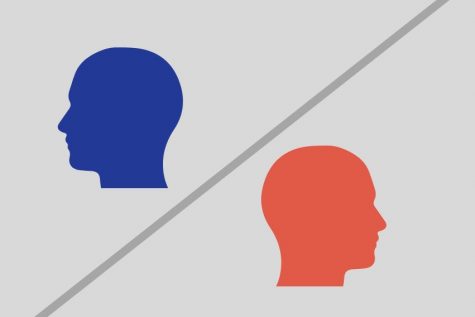Political Intolerance in America: Its Effect on Our Schools

courtesy of Horizon Online
November 6, 2020
In the midst of the 2020 U.S. Presidential election, the nation is severely divided. Riots, protests and looting grow more frequent as the days progress; mainstream and social media remain manipulating the minds of millions; and most of all, political conflict and intolerance continue to drive the american people apart. This conflict has now reached K-12 schools across the nation, tearing classmates and peers apart, causing resentment among students towards teachers, and noticeably affecting class dynamic.
As high schoolers, our biggest worries should be about upcoming tests, what we’re wearing to the next football game, who we’re going to lunch with on early release days. Instead, we are worried about experiencing indoctrination, political intolerance, and verbal aggression in our own classrooms. Bishop Manogue junior Ellie Sexton thinks that “politics should be left out of the classroom unless it’s part of the lesson.” Sexton describes encounters she’s had in the classroom as “hostile” and “judgmental,” and that “both sides would just get into it and make it personal instead of political.” When asked why she thought these situations occur so often, she replied saying that discussions that happen at home amongst parents and other family members can affect the way that students talk to peers in the classroom during discussions. Because of this, many students are afraid to speak out and stand up for what they believe in for fear of being criticized and attacked verbally by their peers, and even teachers in some cases.

Bishop Manogue senior Amy Van Gelder speaks on the topic of the sources that cause these problems. “The media is really biased…most people just believe everything that pops up on their feeds, even though it might not be true.” Van Gelder believes that this contributes to why high schools are starting to become political battlegrounds. She also mentions the impact that teachers have on their students. Amy explains that despite the fact they don’t tell us their political affiliations directly, “it’s pretty transparent whether they’re liberal or conservative…especially in classes like religion and [government].” During class discussions about controversial topics, sometimes teachers even subtly take sides in the argument. This can be the cause of even more problems, such as parents contacting administration to complain.
Although our classrooms are now home to hostility, aggression, and tension between students, there are steps we can all take to make our schools safer, more tolerant environments. First, it is critical that we remember that we should never let politics ruin our friendships, personal and professional relationships. At the end of the day, one’s political affiliations should not define one as a person. Furthermore, it is imperative that we begin keeping open minds, despite our convictions and beliefs. Everyone is entitled to their own opinions, everyone has reason behind their convictions, and our classrooms should not be a place where we challenge each other and degrade each other because of our differences.
